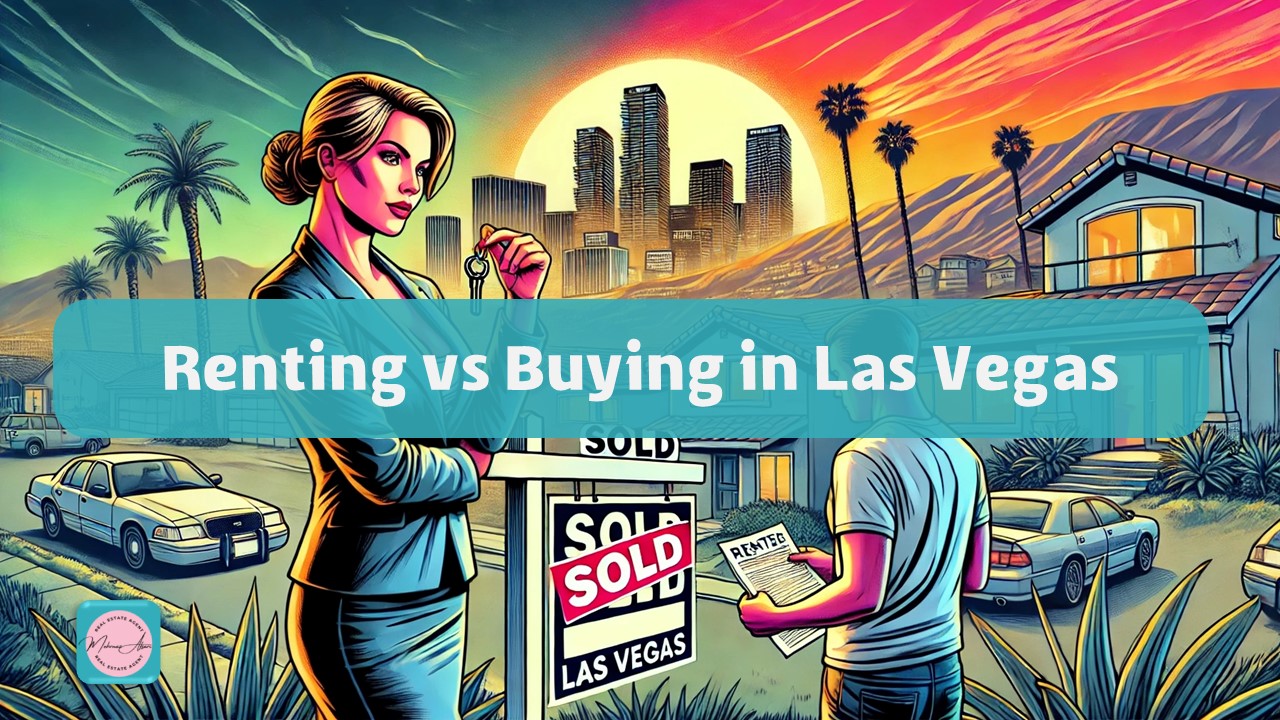Las Vegas is more than just bright lights and casinos—it’s home to one of the fastest-growing housing markets in the country. If you’re considering settling down here, the question likely on your mind is: renting vs buying in Las Vegas—which is better? The answer isn’t one-size-fits-all. It depends on your financial goals, lifestyle needs, and how long you plan to stay.
In this in-depth guide, we’ll break down current market data, financial comparisons, and real-world scenarios to help you decide which option truly makes sense for you. Whether you’re a first-time homebuyer or a renter thinking about making the leap, this guide will equip you with the facts—not the hype.
The choice between renting or buying a home in Las Vegas depends on a variety of personal and financial factors. From affordability and flexibility to long-term investment potential, this guide covers every angle to help you make an informed decision about renting or buying a home in Las Vegas.
Understanding the Las Vegas Housing Market
Before deciding whether renting or buying is the smarter move, it’s crucial to understand where the Las Vegas real estate market stands today. This city is known for its economic cycles, seasonal demand, and fast-paced growth. The trends and numbers behind home values and rental rates will shape the context for every decision you make.
Whether you’re leaning toward renting or buying a home in Las Vegas, this foundational understanding will help you evaluate what makes the most sense for your situation. Market knowledge is essential to setting realistic expectations and avoiding surprises in one of the most dynamic housing environments in the country.
Current Median Home Prices
As of early 2025, the median home price in Las Vegas hovers around $420,000, though this can vary significantly by neighborhood. Areas like Summerlin and Henderson tend to be higher, often exceeding $500,000, while parts of North Las Vegas and older sections of the east side may offer homes in the $300,000–$350,000 range.
Price growth has moderated compared to the post-pandemic boom, but inventory remains relatively low, keeping competition steady. For buyers, this means more balanced conditions than in previous years—though interest rates continue to play a significant role in affordability.
When considering renting or buying a home in Las Vegas, it’s important to understand that affordability remains heavily influenced by these interest rates. Even with stabilized prices, monthly payments can shift dramatically based on financing terms, making it essential to compare total costs carefully before deciding which path aligns with your goals.
Buyer vs. Renter Demand
Buyer demand in Las Vegas has cooled slightly due to higher mortgage rates, yet investor activity and relocation from high-cost states (like California) still fuel interest. Meanwhile, rental demand remains strong, especially among younger professionals, remote workers, and new residents who prefer short-term flexibility before committing to a purchase.
This dual pressure has created a tight rental market—with average monthly rents sitting near $1,800 for a two-bedroom unit, and much higher in central or luxury areas. The result? Both renting and buying come with challenges—and opportunities—for different types of residents.
READ MORE: best places to live in las vegas
Pros and Cons of Renting in Las Vegas
Renting can be the smarter short-term move for many people living in or moving to Las Vegas. With its fast-evolving neighborhoods, seasonal job shifts, and variable home prices, the rental market offers a level of flexibility and financial ease that’s hard to ignore.
When weighing the decision between renting or buying a home in Las Vegas, it’s important to consider how quickly your circumstances might change. Renting allows for quick transitions with minimal financial commitment, making it ideal for those new to the area or facing uncertain job prospects. Still, it’s not without trade-offs. Here’s what you need to consider.
Flexibility and Mobility
Las Vegas attracts a wide variety of residents—from young professionals to remote workers and seasonal employees. Renting allows these groups to explore different neighborhoods without being locked into a long-term commitment. It’s also ideal for newcomers who want to get a feel for the city before deciding where to plant roots.
If your job situation is uncertain, or if you’re not sure how long you’ll stay in the area, renting gives you the freedom to relocate easily—without the burden of selling a home or dealing with market timing.
Lower Upfront Costs
Compared to buying, renting typically requires far less cash upfront. Most renters only need to cover first month’s rent, a security deposit, and sometimes an application fee. There are no closing costs, down payments, or property taxes to worry about—making renting a much more accessible option, especially in a high-demand market like Vegas.
Pros and Cons of Buying a Home in Las Vegas
Homeownership is often seen as a milestone of financial stability—and in a dynamic city like Las Vegas, it can also be a strategic investment. But buying isn’t always the right move for everyone. The benefits are long-term, and the responsibilities are very real. Let’s take a closer look at what buying a home in Las Vegas truly offers—and demands.
Building Equity and Wealth
One of the most compelling reasons to buy a home is the ability to build equity over time. With every mortgage payment, you’re investing in an asset that can appreciate—especially in growth markets like Summerlin, Henderson, or parts of Southwest Vegas. Instead of paying rent with no return, you’re putting money into something you own.
Tax Benefits
Homeowners may qualify for deductions on mortgage interest, property taxes, and certain home-related expenses, depending on federal and state laws. While the tax code changes over time, these benefits can make a noticeable difference—especially in your early years of ownership when interest payments are highest.
Maintenance Responsibilities
Unlike renting, owning a home means you’re fully responsible for all maintenance, repairs, and upgrades. From leaky roofs to broken HVAC systems, these costs add up quickly.
When deciding between renting or buying a home in Las Vegas, it’s essential to weigh these ongoing maintenance responsibilities. In a hot desert climate like Las Vegas, appliances such as air conditioning units are not just conveniences—they’re necessities, and they come with a hefty price tag if replacement is needed.
READ MORE: Why You Should Hire a Real Estate Agent
Financial Comparison: Renting vs Buying
When it comes to choosing between renting and buying in Las Vegas, the numbers tell a powerful story. Renting often appears cheaper month to month, while buying builds long-term equity—but comes with higher upfront costs. In early 2025, the average monthly rent for a two-bedroom apartment in Las Vegas sits at around $1,800. In contrast, buying a median-priced home at $420,000 with a 10% down payment and 6.5% interest rate would lead to a monthly mortgage payment of approximately $2,700, including taxes and insurance.
The initial cost difference is even more pronounced. Renters typically pay a security deposit equivalent to one month’s rent—under $2,000—while buyers must cover a down payment between $21,000 and $84,000, plus an additional 2–4% in closing costs. However, renters don’t build equity, and their payments vanish month after month. Buyers, on the other hand, may face higher short-term expenses but gain long-term value through appreciation and ownership.
Over a 5–10 year horizon, homeowners typically come out ahead—especially in a market like Las Vegas, where property values have historically appreciated. Still, the choice ultimately depends on personal financial stability, plans for staying in the area, and tolerance for risk.
For those evaluating renting or buying a home in Las Vegas, long-term projections can make the difference between a wise investment and a financial burden. It’s crucial to balance upfront costs and monthly payments with the potential for appreciation and the benefits of equity building. Knowing your financial landscape will help you assess whether the long-term commitment of homeownership is worth it—or whether the flexibility of renting remains the smarter move for now.
When Does Renting Make More Sense?
Renting isn’t just a fallback—it’s often the smart choice for those in transitional life phases or uncertain financial situations. If you plan to stay in Las Vegas for fewer than three years, the cost of buying, maintaining, and then reselling a home might outweigh any potential equity gains. Renting gives you the freedom to explore the city, change jobs, or relocate without the burden of selling property.
For those with unstable income or less-than-ideal credit, renting provides time to build financial health. Mortgage lenders in Nevada are strict, and failing to meet credit or income thresholds could either disqualify you or lock you into high rates that increase long-term costs. Renting offers breathing room while you improve your eligibility to buy later—on your own terms.
Finally, in a volatile market, where interest rates or property values are uncertain, renting can offer a strategic pause. If you’re unsure whether the market is peaking or correcting, signing a lease gives you time to monitor trends without locking yourself into a potentially overvalued asset.
This flexibility is a key consideration when evaluating the pros and cons of renting or buying a home in Las Vegas. The ability to step back, assess conditions, and then decide based on data—not pressure—can save money and stress in the long run.
What Real Estate Experts Say
Industry professionals agree: the decision to rent or buy in Las Vegas hinges not just on the market, but on the individual. According to many local real estate agents, including experienced voices in Summerlin and Henderson, 2025 presents a mixed but opportunity-rich landscape. While high interest rates have cooled buying momentum, inventory levels remain tight, and property values are holding steady in most neighborhoods.
Agents emphasize that buyers with long-term plans (5+ years) still benefit from homeownership, particularly if they lock in rates before future increases. Meanwhile, those uncertain about job stability or lifestyle needs are advised to rent—especially as new construction and rental inventory expand across the valley.
Expert advice also highlights the value of working with local professionals. From understanding micro-markets (like Silverado Ranch vs. Centennial Hills) to navigating new lending options or down payment assistance programs, guidance tailored to the Las Vegas area makes a measurable difference in outcomes.
Whether you’re exploring renting or buying a home in Las Vegas, a knowledgeable local agent can help you avoid costly mistakes and uncover opportunities specific to your needs. Their insight can be especially valuable in competitive neighborhoods or when trying to qualify for special financing programs.
Conclusion
So—renting vs buying in Las Vegas: which is better? There’s no universal answer, but there is a smart one—for you.
If you’re a student or new transplant, renting offers flexibility and low commitment. For families planning long-term stability, buying allows you to build equity and enjoy tax benefits.
Whether you’re an investor or simply considering your next move, the decision between renting or buying a home in Las Vegas comes down to timing, financial readiness, and future plans. Las Vegas continues to present strong opportunities in both short-term rentals and long-term value growth, making it essential to evaluate your priorities before making a commitment.
What matters most is your timeline, financial readiness, and lifestyle goals. And you don’t have to make that decision alone.
I’m Agent Mehnaz Afsari, a licensed real estate agent based in Las Vegas. Whether you’re exploring neighborhoods, calculating affordability, or ready to take the next step—I offer personalized consultations to help you move forward with clarity and confidence.
📞 Book a consultation today to evaluate whether renting or buying is right for your current life stage.
FAQ
Is it cheaper to rent or buy a home in Las Vegas right now?
Generally, renting is cheaper month-to-month, but buying can be more cost-effective in the long run if you plan to stay at least 5 years and build equity.
What’s the average rent vs mortgage payment in Las Vegas?
The average rent for a two-bedroom is around $1,800/month, while a mortgage on a median-priced home (with 10% down) averages around $2,700/month including taxes and insurance.
Does buying a home save money in the long run?
Typically. While buying has higher upfront costs, homeowners gain from appreciation, tax benefits, and long-term equity that renters don’t receive.
What credit score is needed to buy a home in Las Vegas?
Most lenders require a minimum score of 620–640 for conventional loans, though better rates and programs are available for scores above 700.
Can I switch from renting to buying later without penalty?
Absolutely. Many renters transition to buyers after improving credit or saving for a down payment. Just be mindful of lease terms before making the switch.





